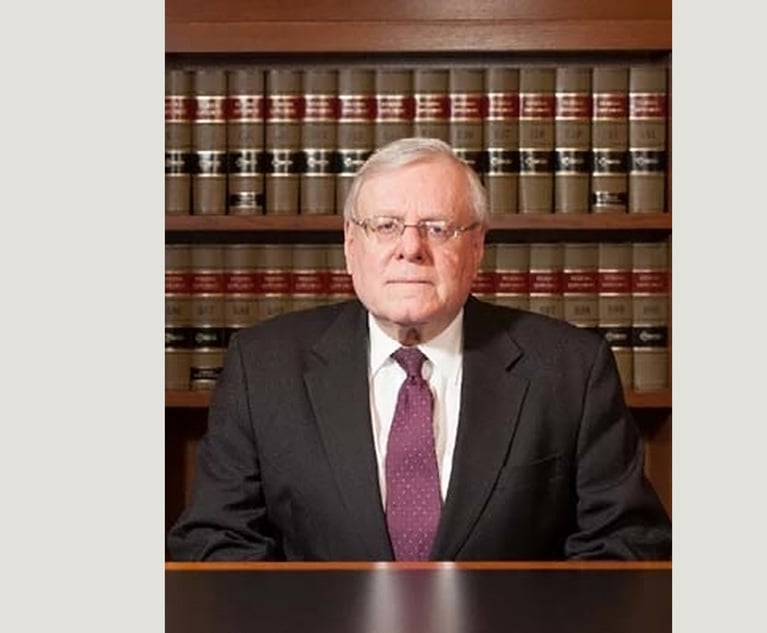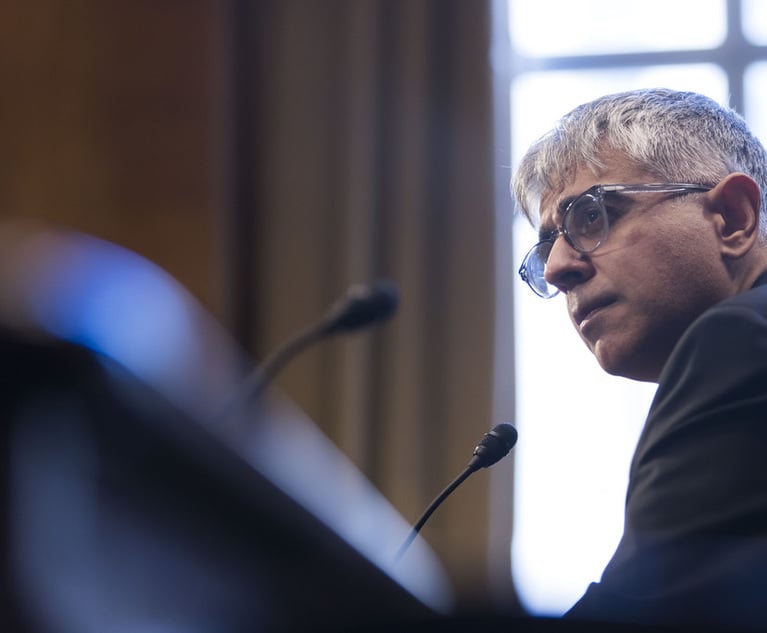Mentor, Civil Rights Icon and Judge: Lawyers Remember Damon Keith, 'Hero to So Many'
Judge Damon Keith first used the phrase “democracies die behind closed doors” in a ruling in which the Sixth Circuit struck down the government's secretive post-Sept. 11 deportation panels.
April 29, 2019 at 04:46 PM
7 minute read
Damon Keith, civil rights icon and federal appeals judge who died Sunday at age 96, is being remembered as a mentor whose “moral compass” and courage broadly helped shape the lives of young lawyers across the country, and “changed the fabric of a nation.”
Keith, whose decisions upheld an affirmative action program at the Detroit Police Department, shot down warrantless wiretapping by the Nixon administration and desegregated Pontiac public schools, was long considered a civil rights champion.
Keith first used the phrase “democracies die behind closed doors,” in a ruling in which the U.S. Court of Appeals for the Sixth Circuit struck down the government's secretive post-Sept. 11 panels used to deport Arab and Muslim immigrants. That phrase has become a rallying cry for transparency in the Trump era.
Beyond his widely heralded rulings, Keith's former clerks said the jurist was instrumental in seeking out and mentoring minority clerks, especially in a field that has often struggled with diversity.
Keith was the grandson of former slaves, and served in the U.S. Army while it was still segregated during World War II, the Detroit Free Press wrote in its obituary. He attended Howard University School of Law, and earned a masters of law degree from Wayne State University. The school's Damon J. Keith Center for Civil Rights was named in his honor in 2011.
Keith was appointed as a U.S. District Court judge in the Eastern District of Michigan in 1967, and was bumped up to the U.S. Court of Appeals for the Sixth Circuit by President Jimmy Carter in 1977.
What follows is a snapshot of some of the outpouring from lawyers across the country as they remember the life and legacy of Keith:
>> Wilmer Cutler Pickering Hale and Dorr partner Ronald Machen, a former U.S. attorney for the District of Columbia and former Keith clerk: “No man has had a greater impact on my life, other than my father, than Judge Keith. I wouldn't be where I am today—he really laid the foundation of my legal career. Every step of my career, he guided me. He was just an unbelievable friend and mentor. … He was a staunch supporter of myself and all of his clerks. And when he was on the bench, he treated everyone with grace and humility, and treated everyone with respect. He was a legendary advocate for civil rights and for justice, standing up for women and minorities. He had an unbelievable ability to always have his moral compass pointed in the right direction and fiercely advocated for positions that at the time few were willing to take.”
 Senior Judge Damon Keith of the U.S. Court of Appeals for the Sixth Circuit swears in U.S. attorney for the District of Columbia Ron Machen during his investiture ceremony on May 24, 2010. Photo by Diego M. Radzinschi/THE NATIONAL LAW JOURNAL.
Senior Judge Damon Keith of the U.S. Court of Appeals for the Sixth Circuit swears in U.S. attorney for the District of Columbia Ron Machen during his investiture ceremony on May 24, 2010. Photo by Diego M. Radzinschi/THE NATIONAL LAW JOURNAL.
>> Judge Eric Clay of the U.S. Court of Appeals for the Sixth Circuit said in a statement published by the Detroit Free Press: “Judge Keith was one of the most influential Federal jurists of the 20th and 21st centuries.” The statement said Keith's “rulings in over 52 years on the bench had a profound impact on American life. His decisions ranged from prohibiting the Nixon Administration from warrantless wiretapping in national security cases, to the integration of the Detroit Police Department and the Pontiac Public Schools.”
>> Wayne State University Law School Dean Richard A. Bierschbach: “We've lost one of the greatest civil rights champions of our time. For more than 50 years, Judge Damon J. Keith has been an unwavering voice for those who have been unjustly silenced. As dean of Wayne State University Law School, proud home to the Damon J. Keith Center for Civil Rights, I know that his legacy will live on in the eyes and hearts of our Damon J. Keith Scholars and every student who learns the law in the center that bears his name. … Words feel inadequate to describe the life of a man who changed the fabric of a nation and how much he meant to the Wayne Law community—he was an extraordinary person and a compass for courage and justice, but that does not even begin to capture the full measure of his character or the impact he had and will continue to have on all of us.”
>> U.S. District Judge Wilhelmina Wright, who clerked for Keith, told NPR: “Judge Keith's legacy is one of courage, of justice, and a willingness of speaking truth to power.”
>> Former U.S. Attorney Eric Holder, now at Covington & Burling, said on Twitter: “Judge Damon Keith was a great lawyer, activist—and became an icon. A hero to so many. This nation is indebted to him for the work he did to make America more just. 'Democracy dies in the dark'—was written by this great man. That phrase is so relevant today.”
>> Sherrilyn Ifill, president of the NAACP Legal Defense Fund, said: “Judge Damon Keith was one of that band of brilliant, courageous African-American federal judges appointed in the late 1960s and 1970s whose jurisprudence, eloquence, and dignity set a standard of excellence. A grandson of slaves, he rose from working as a janitor to become one of the most distinguished jurists in the country. His trenchant opinions spanned the breadth of civil rights, consistently voicing his unyielding commitment to equality under the law and applying it to voting rights, education equity, employment discrimination, sexual harassment, immigrants' rights, and a myriad of other issues gripping our nation. Judge Keith had an unfailing respect for civil liberties, writing in one opinion the now famous line, 'Democracies die behind closed doors.' His uncompromising moral clarity made him an extraordinary force on the federal bench, steadfastly rejecting the constraints opponents of civil rights sought to place on him and other judges of color.”
>> Channing Phillips, former U.S. attorney for the District of Columbia, on Twitter: “Rest In Peace, Judge Keith. Our country is in a better place because of your landmark decisions and we owe you an eternal debt of gratitude.”
>> Detroit Mayor Mike Duggan on Twitter: “During his more than 50 years on the federal bench, he handed down rulings that have safeguarded some of our most important and cherished civil liberties, stopping illegal government wiretaps and secret deportation hearings, and ended the racial segregation of Pontiac schools. Here in Detroit, he opened the doors for countless young law clerks, many of who have gone on to become judges themselves. I have so many fond memories of Judge Keith. I was humbled and honored the two times he administered the oath of office when I was sworn in as Mayor. America is a better place because it had Judge Keith to help safeguard our civil liberties. Our city is a better place because he spent every day of his life as a committed and involved Detroiter. We will miss him dearly.”
>> Michigan Supreme Court Chief Justice Bridget M. McCormack on Twitter: “Judge Keith was an American treasure and our own Michigan hero. I bet @JohnDingell is pretty happy to have his company. But we will miss him. Detroit Judge Damon Keith, who coined 'Democracy dies in the dark,' dead at 96.”
This content has been archived. It is available through our partners, LexisNexis® and Bloomberg Law.
To view this content, please continue to their sites.
Not a Lexis Subscriber?
Subscribe Now
Not a Bloomberg Law Subscriber?
Subscribe Now
NOT FOR REPRINT
© 2024 ALM Global, LLC, All Rights Reserved. Request academic re-use from www.copyright.com. All other uses, submit a request to [email protected]. For more information visit Asset & Logo Licensing.
You Might Like
View All
'That Decision was Wrong:' Federal Judge Rethinks Consumer Protection Class Certification

Republican FTC Commissioner: 'The Time for Rulemaking by the Biden-Harris FTC Is Over'
4 minute read

What Went Wrong With Adeel Mangi's Long, Strange Trip Through the Judicial Nomination Process?
6 minute readTrending Stories
Who Got The Work
Michael G. Bongiorno, Andrew Scott Dulberg and Elizabeth E. Driscoll from Wilmer Cutler Pickering Hale and Dorr have stepped in to represent Symbotic Inc., an A.I.-enabled technology platform that focuses on increasing supply chain efficiency, and other defendants in a pending shareholder derivative lawsuit. The case, filed Oct. 2 in Massachusetts District Court by the Brown Law Firm on behalf of Stephen Austen, accuses certain officers and directors of misleading investors in regard to Symbotic's potential for margin growth by failing to disclose that the company was not equipped to timely deploy its systems or manage expenses through project delays. The case, assigned to U.S. District Judge Nathaniel M. Gorton, is 1:24-cv-12522, Austen v. Cohen et al.
Who Got The Work
Edmund Polubinski and Marie Killmond of Davis Polk & Wardwell have entered appearances for data platform software development company MongoDB and other defendants in a pending shareholder derivative lawsuit. The action, filed Oct. 7 in New York Southern District Court by the Brown Law Firm, accuses the company's directors and/or officers of falsely expressing confidence in the company’s restructuring of its sales incentive plan and downplaying the severity of decreases in its upfront commitments. The case is 1:24-cv-07594, Roy v. Ittycheria et al.
Who Got The Work
Amy O. Bruchs and Kurt F. Ellison of Michael Best & Friedrich have entered appearances for Epic Systems Corp. in a pending employment discrimination lawsuit. The suit was filed Sept. 7 in Wisconsin Western District Court by Levine Eisberner LLC and Siri & Glimstad on behalf of a project manager who claims that he was wrongfully terminated after applying for a religious exemption to the defendant's COVID-19 vaccine mandate. The case, assigned to U.S. Magistrate Judge Anita Marie Boor, is 3:24-cv-00630, Secker, Nathan v. Epic Systems Corporation.
Who Got The Work
David X. Sullivan, Thomas J. Finn and Gregory A. Hall from McCarter & English have entered appearances for Sunrun Installation Services in a pending civil rights lawsuit. The complaint was filed Sept. 4 in Connecticut District Court by attorney Robert M. Berke on behalf of former employee George Edward Steins, who was arrested and charged with employing an unregistered home improvement salesperson. The complaint alleges that had Sunrun informed the Connecticut Department of Consumer Protection that the plaintiff's employment had ended in 2017 and that he no longer held Sunrun's home improvement contractor license, he would not have been hit with charges, which were dismissed in May 2024. The case, assigned to U.S. District Judge Jeffrey A. Meyer, is 3:24-cv-01423, Steins v. Sunrun, Inc. et al.
Who Got The Work
Greenberg Traurig shareholder Joshua L. Raskin has entered an appearance for boohoo.com UK Ltd. in a pending patent infringement lawsuit. The suit, filed Sept. 3 in Texas Eastern District Court by Rozier Hardt McDonough on behalf of Alto Dynamics, asserts five patents related to an online shopping platform. The case, assigned to U.S. District Judge Rodney Gilstrap, is 2:24-cv-00719, Alto Dynamics, LLC v. boohoo.com UK Limited.
Featured Firms
Law Offices of Gary Martin Hays & Associates, P.C.
(470) 294-1674
Law Offices of Mark E. Salomone
(857) 444-6468
Smith & Hassler
(713) 739-1250








